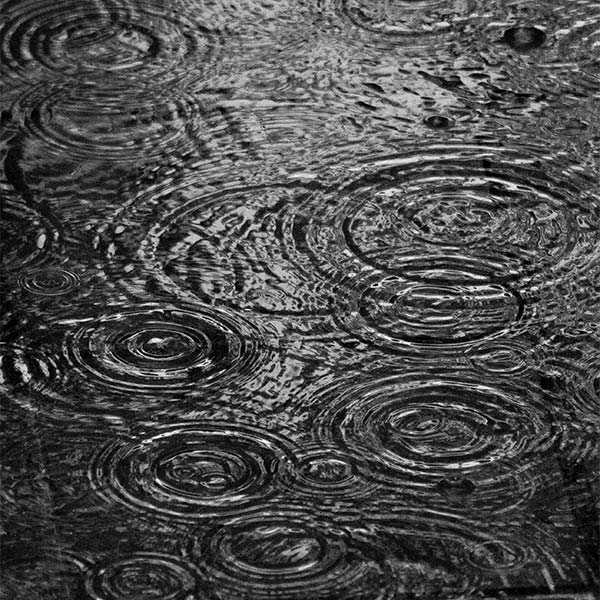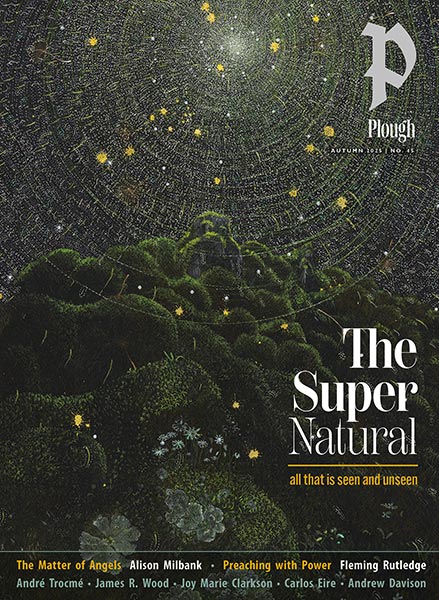Subtotal: $
Checkout
We Are All Responsible
When we take responsibility for our own share in the world’s injustice, suffering can be redeemed.
By Eberhard Arnold
May 4, 2022
From God’s Revolution: Justice, Community, and the Coming Kingdom.
I Am Guilty
When we speak of a radical social revolution, of turning everything upside down, of bringing in the reign of God’s justice, we can only do so if we are deeply convinced that such an upheaval will affect us all quite personally, you and me, every single one of us, as part of humankind. We ourselves have to be thrown over and then put back on our feet. We are all responsible for the social injustice, the human degradation, the wrongs people inflict on each other, both public and private. Each one of us bears guilt toward all humankind because we are deaf and blind to their degradation and humiliation.
1926
A whole web of guilt is spun round the earth, guilt that burdens our consciences. …
One of the petitions of the Lord’s Prayer is: “Forgive us our trespasses,” meaning our guilt. We have all had to see that we are involved in the guilt of the world. We are co-guilty if a whole village in Russia perishes of hunger; if war is waged in South America over a river. We feel we have a guilt in all these things. We feel it most in the question of unemployment. I feel guilty because so many children have nothing to eat. I share the guilt of the British government for tolerating the terrible conditions in India. I feel guilty because prostitution exists as real slavery, because money rules over people. We are guilty for every child who dies tonight! Our guilt is millionfold because of conditions as they now are on earth, and because of the appalling amount of sin. If we realize that, we will understand why Jesus said, “Forgive us our guilt” – not my guilt only, but our guilt!
September 1934
We are not isolated beings. We are parts of an integral whole, the human race. Humankind is harrowed by suffering common to all. A single cry of longing is wrung from it. Humankind waits for the day when all will be one. On that day the great catastrophe will bury everything that divides, and the new day of creation will dawn, bringing the joy of paradise to take the place of all the world’s suffering.
April 1919
Lay Down Your Own Life
We live in poverty and without personal possessions; we do this for love of Christ and for the sake of those who are poorer than we, the very poorest. There is such an endless amount of misery that wealth and affluence are unbearable to anyone living in the love of Christ. Undeniably, sin and injustice rule in the world today, and as long as this continues, there will always be poor people. It is idle to ask what we would do if there were no more poor. Even a rigidly enforced social system has not managed to do away with poverty. Therefore Jesus says, “The poor you have with you always.” And the Old Testament has it: “The poor will always be with you in the land.” Yet this love for the poor cannot be the final thing. It must be surpassed by love to God. Christ says, “You will not always have me with you.”
On the other hand, we must not let our love for God cause us to neglect love to the poor. Out of love to God we should love our neighbor. If you see your brother or sister in need and say, “God will help you,” and give nothing though you have this world’s goods, where is your love to God?
September 1934
If someone wants to take away your jacket, give him your coat as well. Gather no treasures or showy belongings. Dress without adornment, make no attempt to be fashionable or elegant. Can you become a plain and simple person if you affect superior airs? If you become a true Christian, you will never have a fortune. Whatever you do will be done out of love. “Sell everything you have, and only then come and follow me.” Do as the poor widow did. Be true, and because you are true, be simple. Ultimate truth is ultimate simplicity. There can be unity in the church only when all are true in absolute simplicity.
After Jesus had told his disciples, “Gather no treasure for yourselves,” he said, especially for the have-nots, “Do not worry. You must have absolute trust in God, who gives the flowers their beauty and the birds their food. Strive only for the kingdom of God and his justice.” Don’t aim for a well-paid job. You will find the right solution in regard to your occupation. Strive only for the kingdom of God and his justice, and include your wife and children in your striving. Then everything else will come right: the living of each hour and every day. That will make you a real disciple. You must not gather treasure for yourselves, and you must not worry.
December 1932

Photograph by Isi Martinez (Public domain)
There is no greater love than to lay down one’s life for one’s brothers and sisters. Laying down one’s life does not only mean dying a heroic death; it means finding a life in which every moment is lived for others. In such a life we can give all our strength, all our fortune, all our possessions, and all our intellectual gifts for others.
That was the life Jesus lived. He did not ask whether Palestine was too small; he did not hanker after life in a palace in Rome. He acquired no titles or honors, he gained no influential position. He went the lowliest and simplest way. As a newborn child, he lay in a feeding trough for cattle. And his whole way was one of utmost poverty. It was the very simplest way, and it ended as it began – in utter poverty, in the poverty of the cross.
August 1934
Suffering Can Deepen Faith
When we try to grasp the nature of suffering, we will feel that suffering is necessary in our search for fellowship with God. This is because of the inhibited and unredeemed life we live. We need suffering. The more we suffer and become aware of our own wretchedness, the more we realize that Jesus is our only foothold. Pascal never tired of saying that to realize our wretchedness leads to despair unless we acknowledge Christ.
Christ is our redeemer; he knows the depth of our misery. He is our only access to freedom from sin and anguish. He knows our darkness and despair. He holds in readiness for us the strength and joy in life that can free us from our miserable plight. Jesus knows how laborious and burdensome our existence must seem to us, but he lives in communion with God’s spirit, who has the power to free us, and he has told us, “Your Father knows what you need.”
Jesus knew suffering. He knew hunger and thirst. He had no place to lay his head. He had no house, no home. But he knew his Father, and in him he had unbroken joy of spirit. Jesus proved to us that happiness in life depends on one thing only – on how well we know our Father in heaven.
December 1918
When the day of judgment masses the clouds closer and closer together, we must be prepared to go the way of the cross in utter surrender. Just as perfect love was once revealed in Jesus’ condemnation and death, so the church of Christ must complete what is still lacking in Christ’s afflictions.
We have to go still deeper into the willing acceptance of cross and death. Only when we are ready for this can we ask God to intervene and make his history.
1933
The authority of the church community lies in the charge given to it to represent God’s kingdom in the world. One consequence will be persecution. We should realize without a doubt that we will be persecuted. The Hutterian brothers have said repeatedly: We must be willing to be killed. We must be ready to have our homes, our land, our communal property, taken from us; these things are given us only to use in working for our fellows. Each one of us must be willing to give up life itself. And we will never be prepared to do that unless we are ready daily to do the hardest menial work and do it with joy.
1933
Pain is the plow that tears up our hearts to make us open to truth. If it were not for suffering, we would never recognize our guilt, our godlessness, and the crying injustice of the human condition.
April 1919
It is not right to try to remove all suffering, nor is it right to endure it stoically. Suffering should be used, it should be turned to good account, for the glory of God. What makes a life happy or unhappy is not outward circumstances but solely our inner attitude to them.
A precious stone has to be cut and polished if it is to be a perfected gem. Every good soldier of Jesus Christ has to suffer and wants to suffer. Steadfastness in the encounter with suffering shows that we are completely surrendered to God’s will and yet have the courage to act. Both are needed if our lives are to be used.
September 1915
The deepest suffering of all is the isolation of the soul, the alienation of one person from another, the despair born of sin. In a divided soul, the conscience suffers anguish because it is separated from God.
December 1918
Yet deep suffering can bring us closer to God than anything else. In the helplessness of extreme suffering Job was driven to say: “Where shall I find strength to endure? I find no help in myself. My steadfastness is utterly gone.” He was then led to trust in the strength that is greater than any other power. That was Job’s purification. From then on he looked only to God, longed only for God, and was able to call out: I know that God, my defender, my redeemer, lives. Though my body be destroyed, freed from suffering I shall see God.
April 1919
God Calls the Poor and Lowly
Jesus says, “I thank thee, Father, that thou hast hidden these things from the wise and understanding and revealed them to babes.” Precisely those who are lowly and unworthy in the eyes of the world are called by God to do the most vital task on earth, that is, to gather his church and proclaim his gospel.
Again and again, what it amounts to is a clash between two opposing goals: One goal is to seek the person of high position, the great person, the spiritual person, the clever person, the fine person, the person who because of his natural talents represents a high peak, as it were, in the mountain range of humanity.
The other goal is to seek the lowly people, the minorities, the physically and intellectually disabled, the prisoners: the valleys of the lowly between the heights of the great. They are the degraded, the enslaved, the exploited, the weak and poor, the poorest of the poor. The first goal aims to exalt the individual, by virtue of his natural gifts, to a state approaching the divine. In the end he is made a god. The other goal seeks the wonder and mystery of God becoming man, God seeking the lowest place among men.
Two completely opposite directions. One is the self-glorifying upward thrust. The other is the downward movement to become human. One is the way of self-love and self-exaltation. The other is the way of God’s love and love of one’s neighbor.
We pray for the whole human race to be released from the folly and delusion of exalting “wonderful” people. We pray that they may see that the meaning of history and of every human life lies in Jesus Christ, who is the new man. He is the new man toward whom we must strive in organic unity; then we belong to him. Through him and in him humankind will be renewed. And this renewal will begin in the body of Christ, which is the church.
October 1934
Already a subscriber? Sign in
Try 3 months of unlimited access. Start your FREE TRIAL today. Cancel anytime.







Ava Wofford
Yes! I am so far from living out these truths yet take hope in reading them.